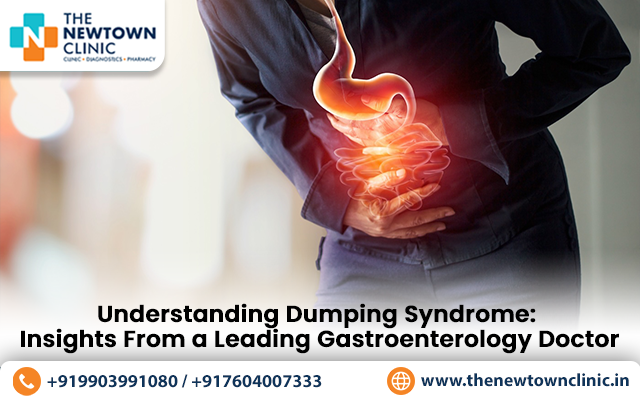Dumping Syndrome is a condition that can occur after certain types of stomach surgery. This syndrome, also known as rapid gastric emptying, happens when food, especially sugar, moves from your stomach to your small intestine too quickly. At the New Town Clinic, we believe that understanding this condition is the first step toward managing it effectively. Our team, led by the best gastroenterology doctor in New Town, is here to provide you with all the information and support that you need.
What is Dumping Syndrome?
Dumping Syndrome can be divided into two phases—early and late. Each phase has its own distinct set of symptoms.
Early Phase Symptoms (within 30 minutes of eating):
Nausea
Vomiting
Abdominal cramps
Diarrhoea
Dizziness
Rapid heart rate
Late Phase Symptoms (1-3 hours after eating):
Sweating
Weakness
Fatigue
Dizziness
Rapid heart rate
Confusion
Not everyone with Dumping Syndrome experiences both phases, and the severity of symptoms can vary from person to person.
Causes of Dumping Syndrome
Dumping Syndrome typically occurs after surgery to remove part or all of the stomach, or after surgery to bypass the stomach for weight loss. When the stomach is smaller or bypassed, food can move more quickly into the small intestine. This rapid movement can cause fluid to shift into the intestine, leading to the early phase symptoms. The late phase symptoms occur due to a rapid rise and fall in blood sugar levels.
Managing Dumping Syndrome
While Dumping Syndrome can be challenging, there are several strategies that can help manage the symptoms. According to our gastroenterology doctor in New Town, these tips can be particularly effective:
Avoid High-Sugar Foods
-
- : Foods high in sugar can worsen symptoms. Focus on a balanced diet with adequate protein, fiber, and healthy fats.
Chew Your Food Thoroughly: Taking your time to chew food properly can aid digestion and slow down the process of gastric emptying.
Drink Fluids Between Meals: Drinking liquids during meals can speed up gastric emptying. Try to drink 30-60 minutes before or after eating instead.
Eat Smaller, Frequent Meals: Instead of three large meals a day, try eating 5-6 smaller meals. This can help prevent your stomach from getting too full and reduce the speed of gastric emptying.
Rest after Eating: Lying down for 20-30 minutes after meals can help slow the transit of food through your stomach.
When to Seek Medical Help?
If dietary changes and lifestyle adjustments aren’t enough to manage your symptoms, it’s important to seek medical advice. Our gastroenterology doctor in New Town is here to help. Treatment options may include medications to slow gastric emptying or, in some cases, surgical interventions.
Conclusion
Dumping Syndrome can be a challenging condition, but with the right knowledge and approach, it can be managed effectively. If you have any concerns or need personalized advice, don’t hesitate to reach out to us at the New Town Clinic. Our team, led by the best gastroenterology doctor in New Town, is dedicated to helping you achieve better digestive health.
For more information or to schedule an appointment, please contact our experts. We’re here to support you on your journey to wellness.

